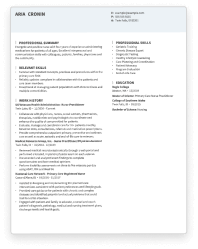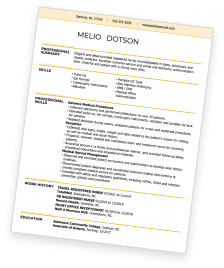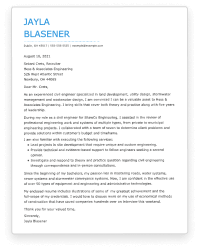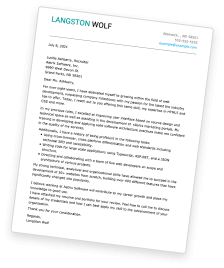Real Estate Resumes: Overview
Real estate professionals play a central role in maintaining the vitality of the property market. They are tasked with facilitating property transactions, drawing up contracts and agreements, managing investments, and ensuring the optimal functioning of real estate assets.
Jobs in the real estate sector encompass a wide range of roles, including:
- Real Estate Agent
- Real Estate Broker
- Property Manager
- Leasing Agent
- Real Estate Appraiser
To effectively interact with clients and close deals, realtors and other real estate professionals must have strong communication, problem-solving, and negotiation abilities. Many practitioners also need a license to practice and must have a deep understanding of the market and local regulations to navigate the industry’s complexities.
Want to effectively highlight these skills and qualifications on your real estate resume? Take inspiration from our library of customizable resume examples and use our downloadable resume templates to quickly and easily build a resume that seizes the spotlight.
Real Estate Resume Example: Real Estate Broker
This real estate broker resume shines on both the content and design fronts. It’s a great example to follow because it features several different winning elements in its design and content.
-
Clarity and Readability:
The resume’s clean and organized layout, with section headers displayed prominently on the left side of the page, enhances legibility, making it easy for hiring managers to navigate their way around the document and find important information quickly.
-
Strong Action Verbs:
The use of descriptive action words, such as “negotiated,” “drafted,” “sold,” and “deployed,” immediately captures attention and makes the document more engaging. They demonstrate proactiveness and clearly communicate what the candidate did and how she contributed in previous roles.
-
Professional Font:
The simple, highly professional font makes the content easy to read and conveys a sense of seriousness and competence. It is also screen-friendly and will display well on different devices and applications.
-
Relevance:
The candidate has only included relevant information in this real estate resume example, ensuring that hiring managers can quickly see her suitability for the position and aren’t distracted by details that don’t relate to the role.
Real Estate Resume Example: Home Staging Professional
Another strong real estate resume example, this functional resume for an aspiring home staging professional successfully promotes the candidate’s qualifications while distracting from a lack of experience.
-
Consistent Formatting:
Neatly aligned text and a consistent use of fonts, bullet points, color, and header styles lend a professional and polished look to the document.
-
Powerful Career Objective:
The candidate’s objective statement appeals to hiring managers by not only detailing her goals and aspirations but also highlighting skills and expertise she can apply to add value to the employer.
-
Balanced Layout:
A good sense of symmetry and even margins on all sides provide a feeling of visual harmony and ensure that the document will look appealing when printed or viewed on a screen.
-
Convincing Skills Focus:
By placing emphasis on her professional skills and providing extensive details about her inherent strengths and learned competencies, the candidate proves that she can succeed in the role despite her limited work history.
How to Write a Real Estate Resume: A Step-by-Step Guide
Now that you know what makes a real estate resume work, it’s time to dive into the ins and outs of resume crafting. You can find heaps of advice in our comprehensive “How to Write a Resume” guide, but for now, here’s a quick look at format options and what to include in the primary resume sections.
-
Choose a Format:
There are three different resume formats to choose from and the right one for you will depend on your needs, professional goals, and experience level. The chronological format is ideal for real estate professionals with an extensive work history as it highlights work experience and career progression.
A combination resume gives equal importance to skills and work history. It is, therefore, best for slightly less experienced candidates or career changers who want to show that they have the required skills and knowledge. Finally, the functional format is a good option for entry-level professionals with zero experience or those with employment gaps as it focuses heavily on skills and achievements, shifting attention away from a sparse work history section.
-
Contact Information:
Your contact details are the essential starting point of your real estate resume. Include your full name, phone number, professional email address, location, and LinkedIn profile if you have one. Make sure this section is clear and current as it’s how prospective employers will reach out to you for potential opportunities.
-
Summary or Objective:
Write a concise and impactful professional summary or objective statement at the top of your resume that captures what makes you a standout candidate. If you have relevant work experience in the real estate field, opt for a resume summary that succinctly outlines your work history, most notable skills, key accomplishments, and unique value proposition. You might also want to mention any specialized areas of expertise, such as residential, commercial, or investment real estate.
If you’re changing careers or just starting out in the industry, consider using an objective statement instead to highlight your career aspirations and interests and align them with the specific role you’re targeting.
-
Work History:
Outline your work history in reverse chronological order, starting with your most recent role and working backward. For each position, mention the job title, company name, location, and your employment dates. Below this, include several bullet points highlighting key duties and accomplishments, expressed using numbers and metrics whenever possible. You could, for instance, spotlight successful property transactions and notable deals, while showcasing how you applied your skills to boost revenue and achieve client satisfaction.
-
Skills:
Your skills section is an opportunity to provide a quick snapshot of your most relevant technical, hard, and soft skills. Try to incorporate at least six to eight of these key competencies into a bulleted list that’s easy to scan, and focus on abilities that are directly related to the position you’re applying for. For example, a resume for a real estate agent might include skills like property valuation, contract negotiation, communication, and customer relationship management, as well as proficiency in real estate software.
-
Education:
Provide insight into your educational background by listing degrees, diplomas, courses, and training programs you’ve attended. Start with your highest credential and mention the name of the institution, its location, the title of the degree or certificate earned, your major and minor if applicable, and your graduation date. In this section, you can also highlight relevant certifications, professional development programs, and real estate designations, such as a state license.
-
Additional Sections (optional):
If there’s information you’re struggling to fit in the mandatory sections mentioned above, you can add custom sections to your real estate resume to strengthen your case. If you’ve completed several certifications, you could choose to list them in a separate “Certifications and Licenses” section, where you can also include details about your state license (required for real estate brokers and agents). If relevant, you could also include sections for volunteer work, honors and awards, and hobbies and personal interests.
Key Skills and Certifications For Real Estate Resumes
Your professional skills and certifications are the distinguishing factors that differentiate you from the competition and can increase your chances of landing the real estate position you desire. Here’s a look at some of the top hard skills and soft skills for real estate professionals, as well as a selection of reputable certifications that could take your real estate resume to new heights.
Top 5 Hard Skills for Real Estate
- Market Analysis: The ability to analyze real estate markets to identify trends, opportunities, and risks is useful in supporting clients to make informed investment and sales decisions.
- Real Estate Financing: An understanding of financial concepts, such as cash flow analysis, ROI, and property financing options, enables you to provide clients with valuable insights and guide them through the complex process of securing mortgages.
- Contract and Purchase Agreement Administration: Knowledge of how to accurately execute legal agreements related to property transactions, leases, and sales helps protect all parties’ interests and prevent disputes down the line.
- Marketing and Advertising: A grasp of marketing techniques and tools ensures you can effectively promote properties, create compelling listings, and attract potential buyers or tenants.
- Software Proficiency: Strong computer skills and a familiarity with CRM systems, property management software, and data analysis tools help to enhance productivity and streamline operations.
Top 5 Soft Skills for Real Estate
- Networking: Building a robust professional network is central to accessing valuable resources, referrals, and industry insights, heightening success in the field.
- Communication: Strong oral and written communication is vital for understanding client needs, negotiating deals, and building strong relationships with buyers and sellers.
- Negotiation: The ability to negotiate effectively improves your chances of securing favorable client deals, boosting customer satisfaction.
- Adaptability: Adaptability helps navigate changing conditions and seize opportunities in diverse and dynamic market situations.
- Problem-Solving: A talent for identifying and quickly resolving issues that arise during real estate transactions contributes to a smooth and successful process.
Top 5 Certifications for Real Estate
- Certified Property Manager (CPM): This premier designation signifies proficiency in managing and maintaining residential or commercial real estate, and covers many aspects of property management, including legal and financial considerations.
- Certified Residential Specialist (CRS): A highly regarded credential for residential real estate agents, managers, and brokers who have demonstrated exceptional expertise in residential sales.
- Certified Real Estate Brokerage Manager (CRB): Aimed at real estate brokers, managers, and firm owners, CRB focuses on performance leadership, business management, brokerage operations, and profitability.
- Certified Commercial Investment Member (CCIM): Considered the gold standard for commercial real estate professionals, this certification validates expertise in market analysis and financial decision-making and attests to extensive experience in the commercial property sector.
- Seller Representative Specialist (SRS): Awarded by the Real Estate Business Institute (REBI), the SRS designation verifies advanced seller advocacy skills and boosts your credibility as a real estate professional who exceeds client expectations.
A real estate resume that features at least some of these key technical skills, personal attributes, and credentials is bound to grab an employer’s attention. While the exact requirements will vary by job, you can use the lists above as a helpful starting point for crafting a document that checks all the boxes.
Helping Job Seekers Like You
10 Tips For Writing A Real Estate Resume
Applying resume writing best practices can make the difference between being noticed and being ignored. Follow these tips to create a compelling resume that captures employers’ interest in the competitive real estate industry:
- Prioritize Relevance: Only include skills, work experience, and accomplishments that are 100% relevant to the real estate job you’re applying for. Study the job description carefully and customize your resume content to show how your qualifications align with the particulars of the role. Any information that doesn’t relate directly to the position should be tossed out.
- Showcase Specializations: If you specialize in a particular area of real estate – such as commercial, residential, or investment real estate – make this clear in your resume to appeal to employers in that niche. Your professional summary is a good place to highlight focus areas.
- Include Strong Action Verbs: Begin each bullet point in your work history section with powerful action words like “negotiated”, “facilitated” and “generated”. These verbs convey your contributions more effectively and make your accomplishments more impactful and engaging for readers.
- Incorporate Keywords: Many employers use applicant tracking systems (ATS) to screen resumes for relevant industry-specific keywords. Include phrases from the job posting to increase your resume’s chances of passing through this system and reaching human reviewers.
- List Relevant Software Programs: The real estate sector has undergone a digital transformation and is now heavily driven by technology. Emphasize your software skills to show that you are up to date with industry trends and well-equipped to handle the technical aspects of the job. You can list specific programs and tools you’re familiar with in your skills section.
- Highlight Negotiation Skills: Work in the real estate industry often involves negotiations. Showcase your ability to negotiate favorable deals for clients and describe how you’ve applied these skills to achieve results in the past.
- Quantify and Qualify Your Experience: Combine quantitative metrics with qualitative descriptions to provide a well-rounded view of your real estate achievements and abilities. Use specific data and percentages to describe accomplishments like the number of properties sold, revenue generated, and client satisfaction ratings.
- Leave Enough White Space: Use ample white space to create a visually appealing resume that keeps the focus on your qualifications. White space helps to separate sections and make the content more digestible.
- Use a Clean, Easy-to-Read Layout: Make a positive first impression by ensuring your resume has a well-organized, readable layout. Avoid clutter and excessive use of colors, include bullet points to make information easy to skim, and use consistent fonts and formatting throughout the document.
- Include a Cover Letter: A well-written real estate resume isn’t enough alone. Always include a tailored cover letter explaining your interest in the real estateposition and how your skills align with the employer’s needs.
Keep these tips in mind when writing your real estate resume and you’ll be well on your way to crafting the perfect document that not only impresses potential employers but also opens doors to novel opportunities in real estate.


Save Time With Hloom's Resume Builder
Key Takeaways
Inspect the job description for the real estate role you’re applying for and tailor your resume to show how you meet the specific job requirements.
In addition to the five primary resume sections – contact information, summary or objective statement, work history, skills, and education – consider including an additional section for real estate certifications and licenses.
Balance hard skills like market analysis and contract administration with soft skills such as networking, communication, and problem-solving to show that you’re a well-rounded real estate professional.
Create a visually appealing real estate resume by using ample white space, consistent formatting, and a well-organized, easy-to-read layout.
More Resume Examples
Save Time With Hloom's Cover Letter Builder


Real Estate Resume FAQ
Citations
- Bureau of Labor Statistics, “Real Estate Brokers and Sales Agents,” Occupational Outlook Handbook, September 2023.
- Bureau of Labor Statistics, “Property, Real Estate, and Community Association Managers,” Occupational Outlook Handbook, September 2023.
- University of Michigan, "Resume Resources," November 2023.




